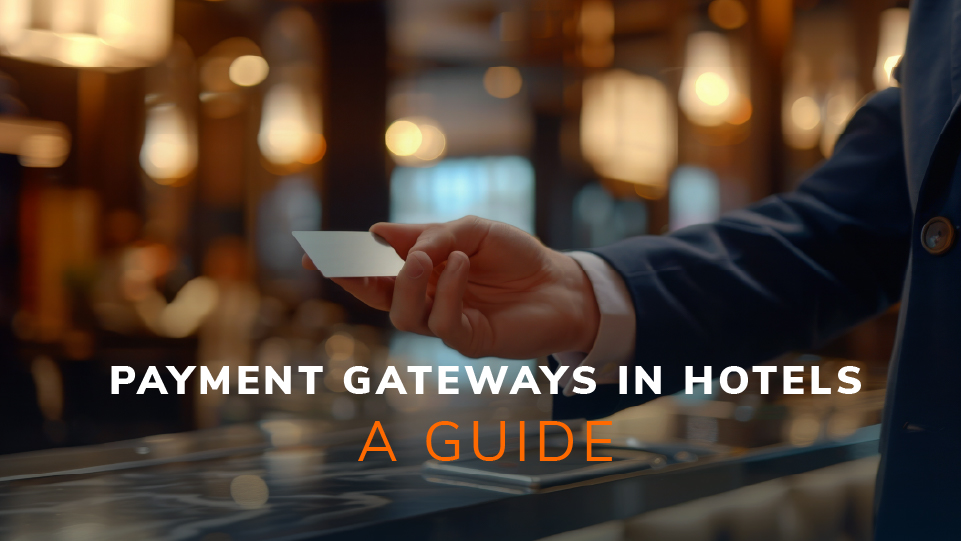Dear WuBookers, today we review a concept that – if you manage a hotel or any other accommodation facility – you will certainly have come across: payment gateways. These platforms are now essential for handling digital payments, and there are several alternatives on the market. Knowing how they work and what requirements they should have to ensure effectiveness and efficiency for hoteliers can help make the right choice.
What payment gateways are and how they work
Payment gateways are technological systems for brokering electronic transactions. When a person makes a purchase online, payment gateways process the request by sending the user’s information to his or her bank and, if everything is correct, transmit the details of the transaction to the receiving company’s bank for the money transfer. All this, within a secure environment, which safeguards the customer’s information and indirectly protects the merchant as well.
Regardless of the payment methods adopted (credit card, debit card or virtual wallet), the gateway:
- encrypts the user’s data, protecting it from possible unauthorized access or violation;
- connects with the payment processor of the two banking institutions (issuer, i.e. the customer, and acquirer, the company);
- if all the conditions to proceed are met (including sufficient balance in the customer’s bank account), it authorizes the payment.
Payment gateways then ensure that the entire virtual payment process goes smoothly, while also reducing the risk of subsequent disputes or lack of availability, in line with current regulations and security protocols.

Initiatives to protect online security: PCI-DSS, PSD2 and SCA
Fraud, data theft and abuse are real risks when it comes to electronic transactions. This is why, for some time now, several initiatives have sprung up to protect users and their financial information.
These include the PCI-DSS (Payment Card Industry Data Security Standard): a protocol that imposes a number of security obligations on entities that process online payments. The risk, for those who do not obtain PCI certification, is to incur heavy penalties with significant economic and reputational damage.
For the past few years, the PSD2 (Payment Services Directive 2), a European regulation that aims to make digital payments more secure by eliminating outdated practices such as the manual PAN and introducing new measures, including SCA, has also come into effect.
The SCA (Strong Customer Authentication), or strong authentication, involves the introduction of some additional requirements for “card not present,” or remote transactions.
Certified and PSD2-compliant gateways enable verified payment transactions to be managed and executed without compromising customer security and facility reliability.
How to choose the most suitable payment gateway
Adherence to current regulations is the first aspect to consider when choosing the payment gateway(s) to offer your customers.
In addition to this, there are other 5 equally important factors.
1. Fee costs
Typically, payment gateways charge a fee for each transaction made. Costs that can also vary depending on the currency in which the payment is made. Conditions, however, change depending on usage and gateway, so the first tip is to investigate what the fees are and assess how sustainable they are for the facility.
2. Management of collections
Depending on the rates and the cancellation policies set, the hotelier may require prepayment of all or only part of the reservation amount (advance and balance upon arrival), or freeze a certain amount temporarily (freeze the amount) or hold it in case of no show at the hotel, and so on.
The gateway must therefore be able to accommodate the collective needs of the hotelier, ensuring that the money is transferred at the right time and in the right way (immediately, at two separate times, etc.).
3. Multi-currency payments
Among the features we recommend you check before activating a gateway for your site is the ability to handle multicurrency payments. An essential option if you want to activate an international clientele and ensure adequate service by accepting reservations in currencies other than your own.

4. Ease of use
Another factor to consider is the ease of use of the gateway, both on the customer and hotelier side. A friendly and easy-to-use interface saves valuable time during the purchase phase, and reduces the risk of losing reservations due to unfriendly or convoluted systems.
Similarly, keeping track of transactions received in a user-friendly manner through the portal’s private area is crucial to verify that everything is running smoothly and correctly.
5. Integration with the PMS.
Payment can be made directly by the customer through the gateways integrated into the hotel’s direct reservation system: a possibility that is not always obvious, and yet it’s essential, depending on the settings and configurations of both softwares.
How to get around this problem? For example, by choosing a hotel PMS such as Zak, WuBook’s Property Management System that connects to all major payment gateways, namely: Stripe, RedSys, Paypal, MercadoPago, Nexi. When a reservation occurs, the gateway handles the transaction and Zak records the payment, notifying the hotelier. Thus, the transaction is protected and the property is relieved of security burdens related to the customer’s data, which are stored and used only by the gateway.
Should the transaction be unsuccessful, the PMS marks the reservation as “awaiting confirmation”: the hotelier knows that there has been an attempt at an unfinalized purchase and can decide to recover it by contacting the customer.
In addition to the various credit and debit card options, Zak also supports bank transfers: one more alternative – always handled through the gateway – available to all customers.

Advantages of payment gateways for hotels
As we have seen so far, the advantages of payment gateways for hotels and other accommodations are numerous.
To summarize, we have:
- user data protection, protected in compliance with existing European legislation;
- increased security also for hoteliers, who avoid the risk of disputes, chargebacks, missed credits and fraud against them due to unusable credit cards;
- reduction of the Workload of the front-desk, which – with some exceptions – can directly receive automatic payments for all set rates;
- speeding up check-in and check-out procedures for both the hotelier and the guest, since all payment-related procedures are automated and immediate.
In short, Payment gateways offer important guarantees to all parties, adding an extra degree of security to the much sought-after direct reservations.
Another good reason to secure a reliable and technologically advanced operations management partner such as WuBook.
